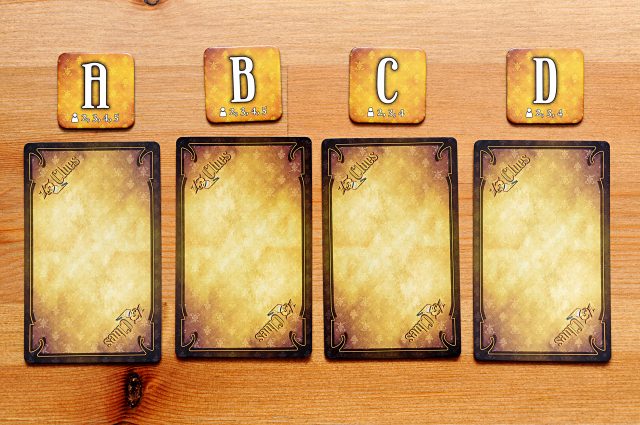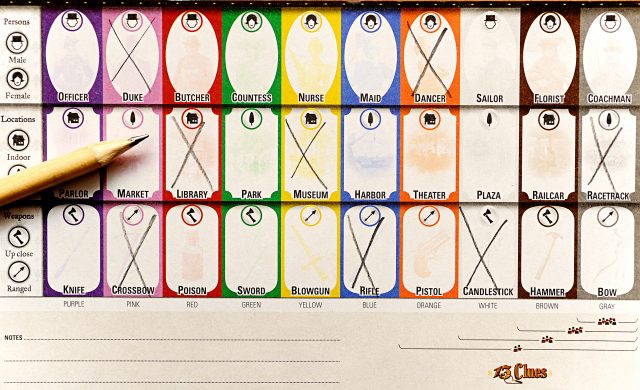London 1899. At the turn of the century, London is reeling under the grip of a crime wave and Scotland Yard simply can’t handle the case load. They’ve turned to you and up to five of your fellow detectives to help with some of the more heinous crimes. Solve your murder first, and you’ll cement your reputation as one of the sharpest minds in the world.
 13 Clues tasks players with coming up with the classic elements of a crime, the location, weapon, and culprit. Each player is working on their own case, but the trick is, all the other detectives can see the solution.
13 Clues tasks players with coming up with the classic elements of a crime, the location, weapon, and culprit. Each player is working on their own case, but the trick is, all the other detectives can see the solution.
At the start of the game, each player is dealt out one card from each of the Locations, Persons, and Weapons decks. Then the decks are shuffled together and each player is dealt out two more cards. From that hand of five, they select one Location, one Weapon, and one Person, placing them face down in front of their player screen. The two leftover cards are placed in the card holders on their side of their screen. Once all the players have selected, they place the three crime elements they’ve chosen in the card slots on the outside of the screen of the player to their left, exposing the crime for all the other detectives to see, except for the one working on it. A set of cards is also placed face down in the centre of the table, forming a secret information pool.
Each of the different types of cards are broken up into two categories and are of one of ten different colours or suits, so the Persons cards are either male or female, the Locations consist of indoor and outdoor cards, and the Weapons are either ranged or up close. These different categories and colours will help with the solving of the crime.
Players also start the game with one Magnifying Glass token, which acts as the currency of the game. On a turn, they will take actions, spending their tokens to complete each one.
 By far, the most common action, at least early in the game, is questioning a witness. For one Magnifying Glass, you can ask another player about what they see. Valid questions include asking them about a category or a suit. So, for example: “How many outdoor Locations do you see?” or “How many red cards do you see?” When asked a question, players must answer honestly, but their response will include the two cards hidden on their side of the player screen.
By far, the most common action, at least early in the game, is questioning a witness. For one Magnifying Glass, you can ask another player about what they see. Valid questions include asking them about a category or a suit. So, for example: “How many outdoor Locations do you see?” or “How many red cards do you see?” When asked a question, players must answer honestly, but their response will include the two cards hidden on their side of the player screen.
Players can pay a Magnifying Glass to an opponent that doesn’t have one to consult the secret information in the centre of the table. By check out one of the cards, they can eliminate one of the possibilities in their case, and as every detective knows, once you eliminate the impossible, the only thing left must be the answer.
As players gain more information and narrow in on the details of their case, they can keep track in their personal casebook.
 Finally, if a player is feeling confident, they can make an accusation. They pay a Magnifying Glass to a player that has none, and then names a Person, Location, and Weapon. If they’re right, they win the game. If they’re wrong, they discard the rest of their tokens and their turn is over.
Finally, if a player is feeling confident, they can make an accusation. They pay a Magnifying Glass to a player that has none, and then names a Person, Location, and Weapon. If they’re right, they win the game. If they’re wrong, they discard the rest of their tokens and their turn is over.
13 Clues takes advantage of one of my favourite in game mechanics. With hidden information, you have to rely on the information you get from the other players to identify the cards you have. This technique first came to my attention with the cooperative game, Hanabi. If you’re a long-time reader, you’ll know that Hanabi is a personal favourite of mine. Since it came out a few years ago, there have been a bunch of different games to use that same idea, but 13 Clues is one of the best. The search for information works well with the murder mystery theme, and the idea of being competing detectives, trying to solve your case first rings true. The art is great and evocative of the period. The cards transport you to London at the turn of the century. Because players spend all of their Magnifying Glasses on their turn, information flows quickly and the game never feels like it’s dragging.
If you’re looking for a good hidden information mystery game, get a clue. Get 13 of them.
Is this game available for purchase yet?